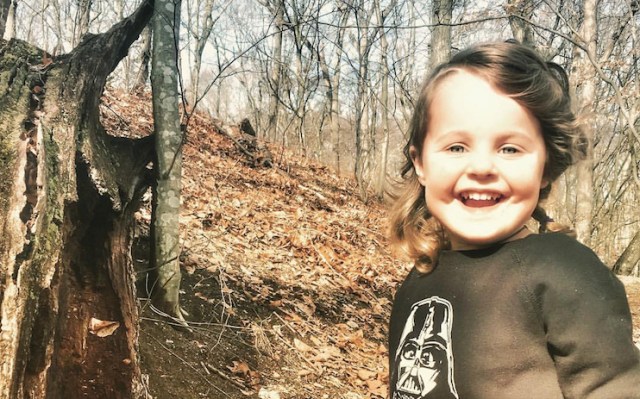
Who do you think gets to spend more time outside? Free-range chickens, prisoners or kids?
The answer is free range chickens get to spend the most time outside, followed by prisoners who are mandated to have 2 hours a day of outdoor time. The sad truth is that most kids these days get less than 1 hour outside and the side effects are pretty scary- including ADHD, social anxiety, depression and even suicide in today’s youth, according to Gever Tulley the founder of the Brightworks School and Tinkering School. Not to mention that the lack of outdoor time for kids leads to a substantial decrease in confidence, creativity, problem solving skills, independence and grit- all skills needed to succeed as adults.
So why is it so important to get kids outside?
Nature is both calming + stimulating at the same time:
Many of us experience and recognize the calming effects of nature. Biologist, Edward Olson may have explained it best in his biophilia theory— that humans are innately drawn to connect and commune with nature. Just being in a natural environment makes us feel centered, at ease and at home. Studies also show that being in nature, or even viewing nature scenes, can reduce negative emotions like anger and fear while increasing positive feelings.
Natural environments not only soothe and center, they stimulate. Outdoor classrooms present learners with captivating sights, smells and textures, stimulating all of the senses. Sensory engagement could not be more critical to early learning—the more kids engage their senses, the more they increase their capacity to take in and turn new information into knowledge.
In an outdoor classroom, the scene is ever changing. Nature’s play objects vary in shape, size and texture, offering endless possibilities for play and learning. It seems impossible to build a playground more engaging or to stock an indoor classroom with such a rich set of learning tools.
In response to this stimulating environment, children’s play in nature is inherently more imaginative, self-directed, and free. Children make messes, experiment and investigate readily, and, in turn, develop essential learning skills. Dr. Kenneth Ginsberg of the AAP (American Academy of Pediatrics) eloquently described this:
“Nature places virtually no bounds on the imagination and engages all of the senses. For all children, this setting allows for the full blossoming of creativity, curiosity, and the associated developmental advances.”- Dr. Kenneth Ginsberg
But even with all of this scientific data at our fingertips, many parents (including myself at one time) are apprehensive to simply “let their kids outside to play.” Our society seems perpetually more worried, more fearful and kids seem to be more overprotected than ever.
So what can we do to prevent “nature deficit” in our kids and to help them succeed?
We need to bring back PLAY, in all seasons.
I recently became a leader within Tinkergarten, an organization that offers outdoor play-based learning classes to local kids (all year round) and have learned that there is no bad weather- only bad clothing.
Tinkergarten’s mission is to bring back something that seems to be lost on this new generation — something that was a most influential part of our own childhoods — free time to tinker outdoors. Kids learn leadership, problem solving, persistence, and more through well-designed, guided play. At Tinkergarten, we think independent exploration, risk taking, getting dirty, and making messes help kids achieve far greater things than drills at the local tutoring center.
The idea that outdoor play (no matter how basic the play) is incredibly important and powerful, is a mindshift that has helped me to become a better mom and a better person. So when my 2 year old daughter is wound up, instead of turning on her favorite TV show, I get her dressed and we go outside. Even if I’m exhausted and need to set up a chair while she plays by herself, I know that she is gaining so much by simply being outside and allowed to explore and tinker. And heck, I’m even happier too!
Do you have a story to share with our readers? We want to hear it! Sign up for our Spoke Contributor Network and start submitting your writing today.











